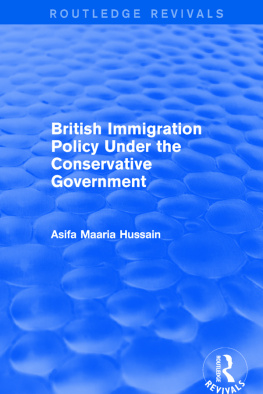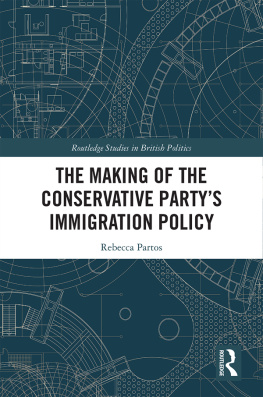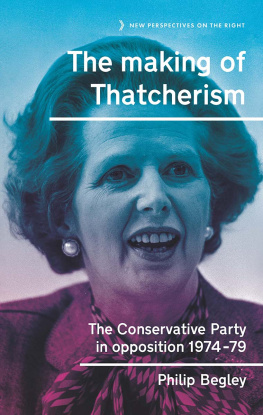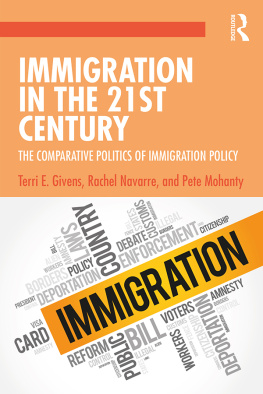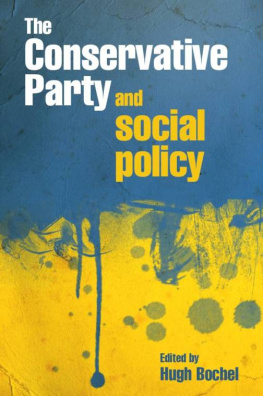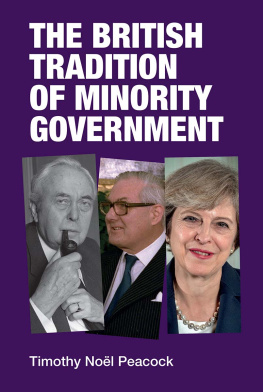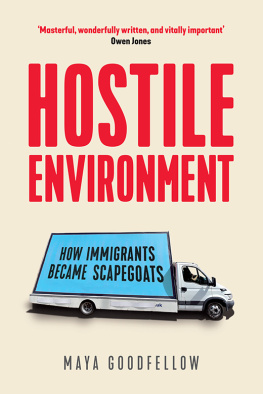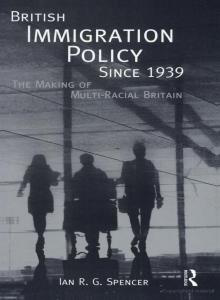BRITISH IMMIGRATION POLICY UNDER THE CONSERVATIVE GOVERNMENT
British Immigration Policy under the Conservative Government
ASIFA MAARIA HUSSAIN
University of Glasgow, UK
First published 2001 by Ashgate Publishing
Reissued 2018 by Routledge
2 Park Square, Milton Park, Abingdon, Oxon OX 14 4RN
711 Third Avenue, New York, NY 10017, USA
Routledge is an imprint of the Taylor & Francis Group, an informa business
Copyright Asifa Maaria Hussain 2001
All rights reserved. No part of this book may be reprinted or reproduced or utilised in any form or by any electronic, mechanical, or other means, now known or hereafter invented, including photocopying and recording, or in any information storage or retrieval system, without permission in writing from the publishers.
Notice:
Product or corporate names may be trademarks or registered trademarks, and are used only for identification and explanation without intent to infringe.
Publishers Note
The publisher has gone to great lengths to ensure the quality of this reprint but points out that some imperfections in the original copies may be apparent.
Disclaimer
The publisher has made every effort to trace copyright holders and welcomes correspondence from those they have been unable to contact.
A Library of Congress record exists under LC control number: 2001090209
ISBN 13: 978-1-13 8-73449-4 (hbk)
ISBN 13: 978-1-315-18723-5 (ebk)
Contents
Under Margaret Thatcher the Conservative party imposed a very tough immigration regime whose impact manifested itself into very serious negative consequences for immigrants from the Indian sub-continent, a region which made up thirty two per cent of all nationalities accepted for settlement in 1980. The exact reason for the tough stance on immigration is open to debate but there is no doubt that it was driven by a combination of political, economic, and nationalistic reasons. The cumulative impact of this tough approach was to cause the break-up and separation of families, which in turn caused suffering and distress among families. The strict approach also saw vigorous procedures to ensure that potential immigrants satisfied the criteria laid out and these were detested by the individuals who had to endure them. The controversial nature of the immigration controls and their impact on individuals was such that it attracted a great deal of criticism and generated much heated political debates.
There were a number of reasons why I chose this particular study, not all of which I can explain in great detail here. Firstly the Conservative partys immigration policy provided an intriguing example of a tough immigration regime in practice, regarded not surprisingly as one of the strictest in Western Europe during its time. Its severe controversy generated some fascinating debates, and had profound effects on the lives of many individuals.
Secondly this research was of interest to me as there has been no research done specifically on the impact on individuals of immigration policy under Thatcher, especially in relation to Scotland. Although it has to be said that as a native Scot giving the study a Scottish flavour gave me personal pleasure.
Glasgow has been chosen as the geographical focus of the study for a number of reasons. Firstly, it has a large community from the Indian subcontinent living there, giving me easier access to conduct a survey and to do individual interviews for case studies. Secondly, since there is a large immigrant population, there are many organisations which have been around since the late 1970s and early 1980s based in Glasgow. These organisations could give me comprehensive knowledge of the problems faced by immigrants in the 1980s. Thirdly, the appellate authority is based in Glasgow which allowed me to sit through the appeal cases on immigration, and write about them when analysing individual cases. This gave me personal experience in the manner in which immigration appeal cases are conducted. Thus many of the political actors involved in the immigration procedures were near enough based in Glasgow i.e. Immigration Police, Adjudicators and Scottish Labour MPs. In other words choosing Glasgow was also a case of convenience that provided me with distinct advantages to undertake my work.
The conventional view expressed by most writers that the Conservative approach to immigration from the Indian sub-continent was discriminatory, harsh and unnecessarily strict, is I believe largely sustained by the findings of this book.
To set out my argument the book is divided into a number of chapters. looks at the various organisations in Glasgow which had the task of protecting immigrant rights, and which had to tackle the legal impediments imposed by government laws by taking on the role of pressure groups.
examines the political perceptions from an MPs viewpoint on the question of immigration. The final chapter simply summarises and concludes the main findings of this work.
The book draws on a rich source of particularly primary sources including official Parliamentary documents and laws, and others which are far too extensive to list here. A considerable amount of fieldwork was involved. To start with all the parties involved in the immigration arena in were interviewed. This included the opinions of the civil servants performing their duties as immigration officials. A survey was conducted on people from the Indian sub-continent living in areas of Glasgow, and the experience of individuals who provided extremely interesting cases was looked at. I interviewed immigration officials in Glasgow about their involvement in immigration and opinion on Conservative immigration policy. I attended regular sittings at a number of immigration cases. A visit to London was made to interview officials from the Home Office and Foreign and Commonwealth Office to get an opinion of how they handled their work, and the criticisms that were levelled against them. Scottish Conservative and Labour MPs were also interviewed to attain some insight into whether they considered the Conservative Immigration policy as discriminatory and if they themselves saw any flaws in the immigration procedures. By interviewing parties from all sides a balanced argument could then be pursued. This work represents the first attempt at tackling in detail the impact of Conservative immigration policy on individuals in Scotland. Most of the sources and information appearing in are therefore new. However, it has to be stressed that immigration is a UK wide issue and therefore the effects of the immigration regime are applicable to the rest of the United Kingdom.
I must express a debt of gratitude to a number of people without whose support it would have been very difficult to pursue such a sensitive study.
Firstly I would like to express my thanks to certain members of the academic staff in the Department of Politics at Glasgow University, who were kind enough to offer me advice and general help on matters or questions which arose from this study. They were: Peter Fotheringham; Bill Miller; and Richard Crook.
I would also like to express my sincere thanks to various officials and individuals in the immigration arena who provided me with useful sources, and some of whom allowed me to interview them. They were: Masood Nabi, former Senior Counsellor at the Immigration Advisory Service who allowed me to keep constant liaison with his organisation; Jean Milne of the Scottish Office for providing me with statistics on ethnic minorities; Nick Troake from the Home Office; Sean Lusk from the Foreign and Commonwealth Office; Stan Crook of the Scottish Refugee Council; and a number of adjudicators and Conservative and Labour MPs (especially Mike Watson). In addition, thanks to individuals from the Indian subcontinent community in Glasgow who made the conduct of the survey and case studies possible, and who entrusted me with much confidential information.

